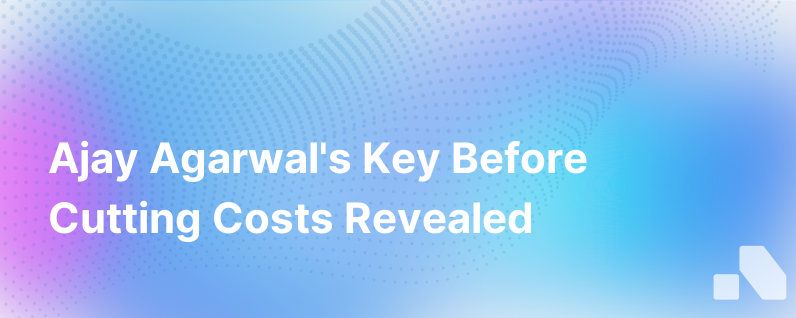Why Bain Capitals Ajay Agarwal Never Cuts Costs Without Doing This First
Published on November 26, 2023 by David Zhang
In the competitive world of venture capital and private equity, Bain Capital has distinguished itself as a leader, adept at transforming the fortunes of struggling entities and driving growth and efficiencies in businesses small and large. At the helm of these strategic decisions often sails Ajay Agarwal, a managing director of the highly esteemed firm. His approach to cost-cutting has been observed and revered by many in the industry for its discernment and effectiveness. But there's a critical step that Agarwal always insists on before making any cuts - a thorough analysis of the customer journey.
Understanding customer touchpoints and experiences is crucial; it informs the decision-making process for strategic cost reduction while preserving, if not enhancing, customer value. Here’s a deeper look into why Agarwal's method is both savvy and successful and how it maintains customer satisfaction and long-term company health.
The Primacy of the Customer Experience
In Ajay Agarwal's playbook, customer experience takes precedence. It's a philosophy that reverberates through Bain Capital's approach. Before contemplating any cost reduction, he seeks to understand how those cuts could affect the end-to-end journey of the customer.
Why does Agarwal emphasize customer experience so? Because in today's market, products and services are increasingly commoditized. The true differentiator often isn't just what you sell, but how you sell it and support it. Customer experience is the linchpin that can swing the loyalty pendulum, influencing repeat business and affecting the brand's reputation. It's about looking beyond the spreadsheet and recognizing that any cost-saving measure shouldn't undermine what customers value most.
Data-Driven Decisions
Data is the compass that guides every savvy decision Agarwal makes. Before considering cost cutbacks, his team dives into the granular details of customer interactions. They're looking for patterns that reveal what services and features are vital for customer satisfaction.
Through this analysis, Bain Capital develops a sophisticated understanding of where costs can be trimmed without detracting from the customer's perception of value. By leveraging data analytics and customer feedback, Agarwal and his team can hone in on areas of inefficiency or redundancy that, when addressed, will not compromise customer satisfaction.
Balancing Cost Cutting With Investment
An often overlooked aspect of cost management is the balance between reduction and reinvestment. Agarwal isn't just looking to chop down expenses blindly; he aims to reallocate resources in a manner that catalyzes growth.
In some instances, this may mean cutting costs in one area to invest in technology or initiatives that could improve customer satisfaction or open new revenue streams. For example, if analysis indicates that digital channels are a growing preference among customers, cost savings from brick-and-mortar operations might be redirected towards enhancing the digital customer experience.
Competitive Analysis
Ajay Agarwal also knows that any cost-cutting measures must be informed by a thorough understanding of the competitive landscape. It's not enough to look inward; his approach requires scrutinizing what competitors are offering. This comparative analysis serves as a critical backdrop for any cost-reduction strategies, ensuring that cuts do not inadvertently give competitors an edge in terms of customer satisfaction or perceived value.
Cultural Considerations
Part of what has made Agarwal's approach at Bain so successful is his consideration of company culture in the cost-cutting process. He understands that certain costs, sometimes dismissed as superfluous, might be integral to maintaining an organization's culture, which in turn can affect employee morale and productivity—a vital component of customer experience.
By appreciating company culture and its impact, Agarwal ensures that cost cuts do not undermine the internal dynamics that indirectly shape the customer experience. This may include maintaining budgets for employee training, development, and benefits, which are seen as indirect investments in the customer experience.
A Human-Centric Approach
Ultimately, what sets Ajay Agarwal's strategy apart is its human-centric approach. Reducing costs without devaluing the human element—be it impacting the customer, the employee, or the brand—is at the heart of his philosophy.
In implementing cost reductions, Agarwal's method analyzes not just the financial implications but also the human response. How will it affect customer loyalty? How will it influence employees' capacity to deliver superior service? These considerations remain paramount.
A Case for Long-Term Strategy
Another dimension to Ajay Agarwal's prudent approach is the emphasis on long-term sustainability. While cost cuts might offer immediate relief to the bottom line, if they're done without a strategic eye on the future, they can be more harmful than helpful. Agarwal's focus is to ensure the business remains competitively positioned not just for the next quarter, but for years to come.
In Conclusion
In a corporate culture obsessed with bottom-line figures, Ajay Agarwal's philosophy offers a more nuanced approach to cost-cutting—always through the lens of customer value. It's an approach that doesn't just look at the numbers; it sees the people behind the numbers. It’s this human-centered analysis that has made Agarwal's strategy a cornerstone of Bain Capital's sustained success.
When companies contemplate cost reduction, following Agarwal's lead by prioritizing customer experience through data-driven, human-centric, and sustainable strategies may well be the wisest move. It’s a strategy that ensures businesses aren't just surviving in the short term but are poised to thrive well into the future.
And it's a strategy that finds resonance with the ethos of platforms like Aomni, where empowering sales strategies with deep, actionable customer insights align with the goal of delivering exceptional value without unnecessary cost. Keeping the focus firmly on what truly enhances the customer journey, Aomni, like Agarwal, underscores the importance of strategic planning in a cost-sensitive landscape.